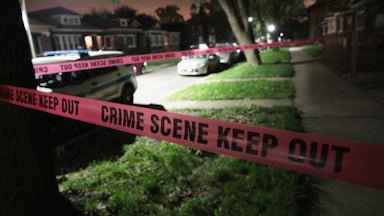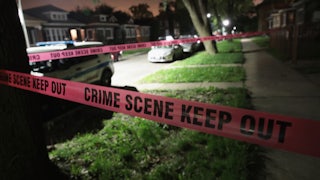Earlier this month, the Supreme Court heard oral arguments in a challenge of two voting rules in Arizona—one that bans most third parties from collecting absentee ballots and another that disqualifies lawful votes that were cast in the wrong precinct. Jessica Amunson, representing Arizona Secretary of State Katie Biggs, urged the high court to strike them down, arguing that they “impose discriminatory burdens on Native American, Latino, and black voters that are not justified by any legitimate state interest.”
Chief Justice John Roberts went first. “Counsel, you’re aware of what the Carter-Baker Commission found about ballot harvesting,” he told Amunson, using conservatives’ intentionally menacing alternative phrase for ballot collection. “They said that absentee ballots are the largest source of potential voter fraud. They said citizens who vote at home, at nursing homes, at the workplace or church are more susceptible to pressure or to intimidation and that they recommended that the practice of allowing candidates or party workers to pick up and deliver absentee ballots should be eliminated.”
Roberts’s reference—and similar ones from other justices during those oral arguments—marked yet another high-profile invocation of the Carter-Baker Commission’s report. But it was far from the only recent one. As the voting wars raged in statehouses and courthouses across the country over the past year, perhaps the most frequently cited analysis was a 16-year-old report on election reform led by two men who left the government three decades ago. As a result, a report designed to rebuild confidence in American elections has played a quiet but important role in undermining them.
The Carter-Baker Commission, which was founded in 2004, followed the typical model of modern blue-ribbon panels. It was led by former President Jimmy Carter and former Secretary of State James Baker, two elder statesmen who gave it a bipartisan imprimatur and political heft. But the report, released in 2005, wasn’t commissioned by Congress or the White House. It instead was organized by American University’s Center for Democracy and Election Management. Nonetheless, its conclusions have been treated by legislatures and courts with the same respect granted to official government commissions.
What drove the commission’s formation was a sharp, urgent decline in public confidence surrounding the American democratic process 20 years ago. The problem became especially apparent after the 2000 and 2004 presidential elections. In 2002, Congress passed the Help America Vote Act to correct some of the flaws that were apparent after Florida’s hanging chad meltdown two years earlier. But the commission’s leaders argued that more needed to be done, citing polls on the eve of the 2004 election that found only one-third of Americans were confident their ballot would be counted.
In the end, the report found multiple problems with HAVA’s implementation in the states, as well as scattered instances of election maladministration and persistent structural flaws in the American electoral system. The commission ultimately offered 87 recommendations. Some were fairly commonsense, like improving access for people with disabilities and developing backup plans for equipment failures on Election Day. Others were somewhat bolder for their time, like re-enfranchising most people with felony convictions after they served their sentence, as well as a rotating regional system for presidential primaries to improve participation. Because U.S. elections are so decentralized, it’s hard to tell how many jurisdictions adopted some or all of the commission’s recommendations. More than a few of its proposals are now so ubiquitous that it likely had some influence on the American election system.
But that’s not how the report is remembered today, at least not by conservatives looking for ammunition to discredit election results and restrict voting rights. The report also discussed the risk of fraud in aspects of the election system, such as duplicate voter registrations in multiple states and deceased voters on voter rolls, and called for measures like voter ID laws to restore confidence in the system. In the 2008 Supreme Court case Crawford v. Marion County, Justice John Paul Stevens favorably cited the report to justify his vote to uphold Indiana’s voter ID law, which opened the door to a wave of similar laws nationwide. Some of those laws have since been criticized for suppressing turnout in communities of color; a former Wisconsin attorney general infamously credited that state’s voter ID law for Donald Trump’s victory there in 2016.
The Carter-Baker report was also skeptical toward voting by mail. “While vote by mail appears to increase turnout for federal elections, there is no evidence that it significantly expands participation in federal elections,” the report stated. “Moreover, it raises concerns about privacy, as citizens voting at home may come under pressure to vote for certain candidates, and it increases the risk of fraud.” It noted that Oregon “appears to have avoided significant fraud” with measures like signature verification. “Vote by mail is, however, likely to increase the risks of fraud and of contested elections in other states, where the population is more mobile, where there is some history of troubled elections, or where the safeguards of ballot integrity are weaker.”
During the Covid-19 pandemic, in an effort to reduce the risk of infection at polling places, many states expanded the categories of people who could request an absentee ballot. The Carter-Baker report’s conclusion that mail-in ballots were “the largest source of potential voter fraud” thus became a staple feature of op-eds in the conservative press, as well as lawsuits filed by the Trump campaign and its allies during and after the 2020 election. In a brief filed in support of Texas’s doomed request for the Supreme Court to throw out electoral votes in December, Trump’s lawyers told the justices that the states he lost had “gutted the safeguards for absentee ballots through non-legislative actions, despite knowledge that absentee ballots are ‘the largest source of potential voter fraud,’” citing the Carter-Baker report. Texas Attorney General Ken Paxton invoked the same quote about absentee voting three separate times in his original lawsuit. The court ultimately was not swayed.
The report’s concerns about voter fraud nonetheless continue to carry great weight, particularly among the conservative justices. When Amunson, the lawyer for Arizona’s secretary of state, told the justices that there was “no such danger” in that state, Justice Neil Gorsuch pushed back by citing the general risk mentioned in the Carter-Baker report, as well as incidents in other places. “What about that is insufficient?” he asked. “When you have the Carter-Baker Commission saying that a particular state law is a good idea as a matter of policy,” Justice Brett Kavanaugh noted, “that would seem to be a circumstance that, as a matter of common sense, would lend support to the state [law].”
On Tuesday, Jimmy Carter himself finally pushed back against misinterpretations of his work. The Georgia native issued a statement denouncing efforts by his state’s lawmakers to rewrite the election laws in their favor. Republican lawmakers there are currently considering measures that would sharply cut absentee voting and early voting, citing the risk of voter fraud in what appears to be a thinly veiled attempt to depress Democratic turnout. “I also am disappointed that advocates for these restrictive changes have repeatedly and selectively referenced a report prepared by a 2005 commission that I co-chaired with former Secretary of State James Baker,” Carter said.
“While our report noted a few good and bad examples of vote-by-mail practices, its main recommendation was that further study of voting by mail was needed,” Carter went on to explain. “In the 16 years since the report’s release, vote-by-mail practices have progressed significantly as new technologies have been developed. In light of these advances, I believe that voting by mail can be conducted in a manner that ensures election integrity. This is just one of several ways to expand access to the voting process for voters across the state, regardless of political affiliation.”
Invoking Carter, a former Democratic president whose postpresidential center monitors elections in emerging democracies, must be an irresistible tactic for those on the right who support restrictive measures. But as Carter himself noted, it’s a misleading portrayal at best. The commission did not recommend an end to voting by mail, nor did it propose any particular changes to existing laws on it—just further study. And its other anti-fraud recommendations urged states to take steps to ensure that the proposals didn’t disenfranchise any otherwise valid voters. In its recommendation on voter ID, for instance, the commission urged states to provide free IDs to qualified voters who didn’t have a driver’s license.
In hindsight, the report seems like a relic of a bygone age, in which elders from both parties could try to hammer out major election reforms in good faith. After a decade of intense partisan warfare over gerrymandering and voter ID laws; the Supreme Court’s move to gut the Voting Rights Act in 2013; and, well, the entire Trump era, it’s hard to imagine a group with similar credibility emerging anytime soon to push for electoral reform. That makes doubly tragic that a report that once sought to improve the public’s faith in American democracy is now mainly used to dispel it.








